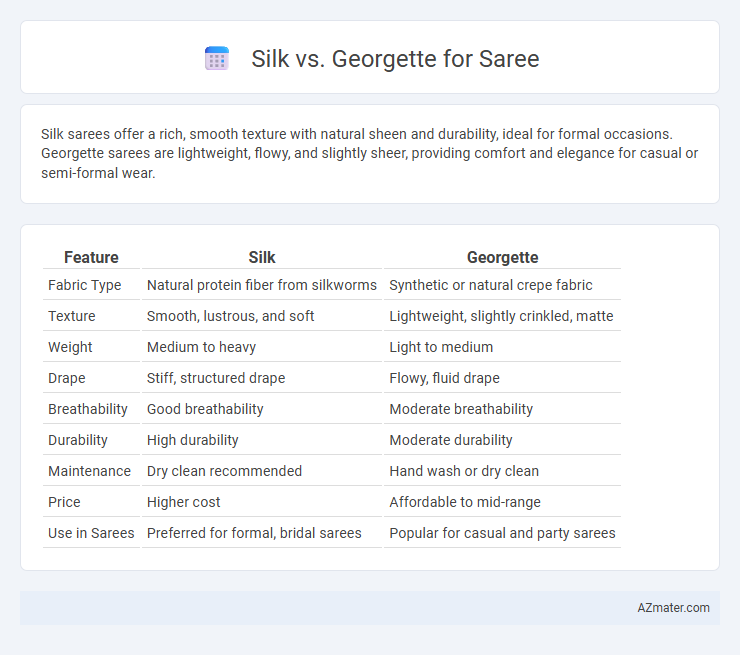Silk sarees offer a rich, smooth texture with natural sheen and durability, ideal for formal occasions. Georgette sarees are lightweight, flowy, and slightly sheer, providing comfort and elegance for casual or semi-formal wear.
Table of Comparison
| Feature | Silk | Georgette |
|---|---|---|
| Fabric Type | Natural protein fiber from silkworms | Synthetic or natural crepe fabric |
| Texture | Smooth, lustrous, and soft | Lightweight, slightly crinkled, matte |
| Weight | Medium to heavy | Light to medium |
| Drape | Stiff, structured drape | Flowy, fluid drape |
| Breathability | Good breathability | Moderate breathability |
| Durability | High durability | Moderate durability |
| Maintenance | Dry clean recommended | Hand wash or dry clean |
| Price | Higher cost | Affordable to mid-range |
| Use in Sarees | Preferred for formal, bridal sarees | Popular for casual and party sarees |
Introduction to Silk and Georgette Sarees
Silk sarees, crafted from natural protein fibers produced by silkworms, are renowned for their luxurious texture, lustrous sheen, and durability, making them a timeless favorite for weddings and special occasions. Georgette sarees, made from lightweight, tightly woven synthetic or silk fibers, offer a semi-sheer appearance with a crinkled texture that provides graceful draping and ease of movement. Both fabrics enhance the saree's elegance, with silk emphasizing richness and traditional appeal, while georgette focuses on fluidity and contemporary style.
Fabric Origins and Production Process
Silk sarees originate from the natural protein fiber produced by silkworms, primarily cultivated in regions like India, China, and Thailand, involving a labor-intensive process of rearing silkworms and extracting raw silk threads. Georgette fabric, originally developed in France, is typically made from silk or synthetic fibers such as polyester, created through a weaving technique that produces a lightweight, crinkled texture with a balanced plain weave. The production of silk sarees emphasizes handloom weaving and traditional craftsmanship, while georgette sarees often involve machine weaving and chemical processing to achieve their characteristic drape and durability.
Texture and Feel: Silk vs Georgette
Silk sarees are known for their smooth, lustrous texture and rich, luxurious feel, which feels soft and cool against the skin, making them ideal for formal occasions. Georgette sarees, made from lightweight, crinkled fabric, offer a slightly textured, matte finish with a flowy and breathable feel that drapes effortlessly. While silk provides a polished and elegant appearance, georgette excels in comfort and ease of movement, especially in warmer climates.
Durability and Longevity Comparison
Silk sarees are prized for their natural strength and long-lasting durability, often surviving years with minimal wear due to the tightly woven protein fibers. Georgette sarees, made from synthetic or silk blends, offer moderate durability but tend to be more prone to snags and fabric thinning over time. When comparing longevity, silk sarees typically outlast georgette with proper care, making them a more enduring choice for traditional attire.
Weight and Drape: Comfort Factors
Silk sarees are heavier due to their dense weave, offering a structured drape that maintains its shape and adds elegance, while Georgette sarees are lightweight with a slightly sheer texture, providing a fluid and effortless drape that enhances comfort during long wear. The weight of silk can make it less breathable and warmer, ideal for cooler climates or formal occasions, whereas Georgette's breathability and softness make it preferable for warmer weather and casual settings. Choosing between silk and Georgette for sarees depends on the desired balance between visual richness and ease of movement.
Design Versatility and Embellishment Options
Silk sarees offer rich texture and depth, making them ideal for traditional designs and heavy embellishments such as zari, embroidery, and beadwork, enhancing a regal appearance. Georgette sarees provide greater design versatility with their lightweight, flowy fabric, allowing intricate prints, sequins, and modern embellishments that suit both casual and formal occasions. The combination of fabric properties and embellishment adaptability makes silk perfect for structured elegance, while georgette excels in contemporary, versatile styling.
Cost and Affordability
Silk sarees are typically more expensive due to the cost of raw silk and intricate weaving techniques, making them a premium choice for special occasions. Georgette sarees, made from synthetic fibers, offer a more budget-friendly option with a lightweight drape and easier maintenance. For those prioritizing affordability without compromising elegance, georgette sarees provide excellent value while silk sarees remain a luxury investment.
Occasion Suitability: When to Choose Which
Silk sarees are ideal for formal occasions such as weddings, festivals, and traditional ceremonies due to their rich texture, luxurious sheen, and elegant drape. Georgette sarees suit semi-formal events, casual gatherings, and evening parties because of their lightweight fabric, fluid fall, and comfort in warmer climates. Choosing silk ensures a regal appearance for grand celebrations, while georgette offers versatility and ease of wear for less formal occasions.
Maintenance and Care Tips
Silk sarees require delicate handling, with dry cleaning recommended to preserve their sheen and avoid fabric damage, while avoiding direct exposure to sunlight and storing them in breathable cotton covers prevents discoloration and moisture buildup. Georgette sarees, being lightweight and less prone to wrinkles, benefit from gentle hand washing with mild detergent or dry cleaning, and should be air-dried away from direct sunlight to maintain fabric softness and color vibrancy. Proper storage of both fabrics, such as folding without harsh creases and using acid-free tissue paper, extends saree longevity and keeps them looking elegant.
Final Verdict: Which Saree Is Right for You?
Silk sarees offer a rich, lustrous texture ideal for formal occasions, while georgette sarees provide a lightweight, flowy drape perfect for casual or semi-formal events. Choose silk if you prefer traditional elegance and durability, and opt for georgette for comfort and ease of movement during long hours. Your decision depends on the event type, climate, and personal style preference.

Infographic: Silk vs Georgette for Saree
 azmater.com
azmater.com